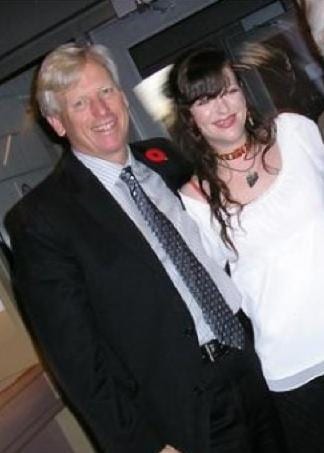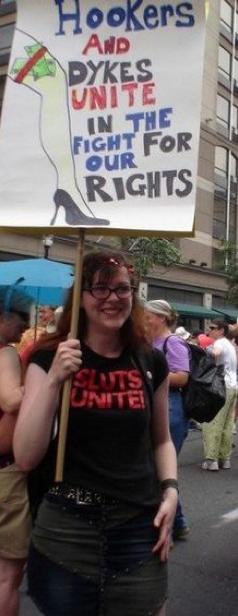
Wendy Babcock and former mayor David Miller. Credit: From Babcock's Facebook

Wendy Babcock out protesting for sex worker rights. Credit: Wikipedia
To her friends, Wendy Babcock was a fierce and passionate activist with a joyful sense of humour that defined her, but inside she suffered in silence.
Babcock was found dead in her home Aug 9 of an apparent suicide. She was about 30 years old (her actual age is unclear).
Before becoming a student at York University’s Osgoode Hall Law School, Babcock was a homeless teenaged sex worker. For the past several years she has passionately advocated on behalf of sex workers and has been a prominent voice for trans rights across Canada.
Known for her unwavering compassion and patience, Babcock worked tirelessly on the front lines with some of Toronto’s most marginalized street people, says Tori Scout, one of Babcock’s close friends and chosen family.
But a life filled with struggle took its toll and Babcock suffered invisibly, Scout says. The pair met while attending George Brown College’s Assaulted Women’s and Children’s Counsellor Advocate Program (AWCCA). “She just couldn’t take it anymore. She had a 24-hour support system around her at the time of her death, but it wasn’t enough.”
Her friends call her death an enormous loss to Toronto.
“Wendy was a beautiful person who has been suffering for a long time due to abuse, poverty and the trauma of losing her son,” says Scout. “This woman was a fierce fighter. Her strength is now holding us all together.”
Babcock was forced to surrender her son, Korin, when she was homeless in 2003, Scout says.
“Her son will find out someday how much she loved him,” she says.
Scout says the community as a whole failed Babcock. She was continually denied any information about her son, who is in the care of the Children’s Aid Society (CAS), and devoted her life to getting him back, even giving up sex work. Scout says, “She would have done anything to get him back.”
Danielle Sheppard, who met Babcock working at Maggie’s in 2003, then later at Sex Professionals of Canada (SPOC), says she is still in shock. “It hasn’t hit me yet. Wendy inspired me to become an activist in the first place.”
Sheppard says Babcock was “always an activist.” Armed with sharp wit, Babcock was happy to spend any amount of time answering anyone’s questions on sex work, in an ongoing effort to help people understand that sex workers deserve the same respect and compassion as anyone else.
“She could talk to anyone and always had a funny comeback to disarm even the most conservative,” Sheppard says. “I really hope people continue to fight for what was important to her. We must continue to be vigilant and keep her memory alive.”
Close friend Morgan Page, who is the trans community services coordinator at the 519 Church St Community Centre, says Babcock had just completed the draft of a memoir to coincide with her graduation. Page says Babcock’s friends will now work to have the memoir published in her honour.
“What a lot of people are forgetting is that Wendy was just a regular person, but she took a realistic view to sex work. There was no romanticizing it. Some people choose to do sex work, while others are forced to because they have no other option, but all deserve the same respect.”
“She should have been a comedian. She used to say, ‘A blow job is better than no job.’”
Along with numerous outreach projects, Babcock founded the Bad Date Coalition of Toronto, which produces a monthly Bad Date Book to report on violent acts committed against sex workers, including details of attackers.
Babcock also worked at Street Health, a nursing foundation that works with homeless people in the city. There, she worked in partnership with Regent Park on the Safer Stroll Project, a sex worker and crack user drop-in.
Former mayor David Miller presented Babcock with Toronto’s inaugural Public Health Champion award in 2008, which recognizes outstanding individuals who make outstanding contributions to protecting and promoting the health of Toronto residents.
“Wendy broke new ground and blazed a trail,” says Nikki Thomas, from SPOC. “She was always open and honest about her history with everyone, and that took a lot of courage. She pushed rights for sex workers forward.”
Through her outreach work, Babcock also partnered with the Toronto Police Service to ensure sex workers can report assault without fear of prosecution. “She created changes within the police force. She really made police more sensitive to these issues,” Scout says.
Just this year, Babcock joined Lover Magazine, North America’s first women’s sexuality magazine, as a writer on sex-work issues.
A community meeting has been planned to organize a memorial service and funeral for Babcock. The meeting will be held at The 519 on Aug 12 at 5:30pm.

 Why you can trust Xtra
Why you can trust Xtra


